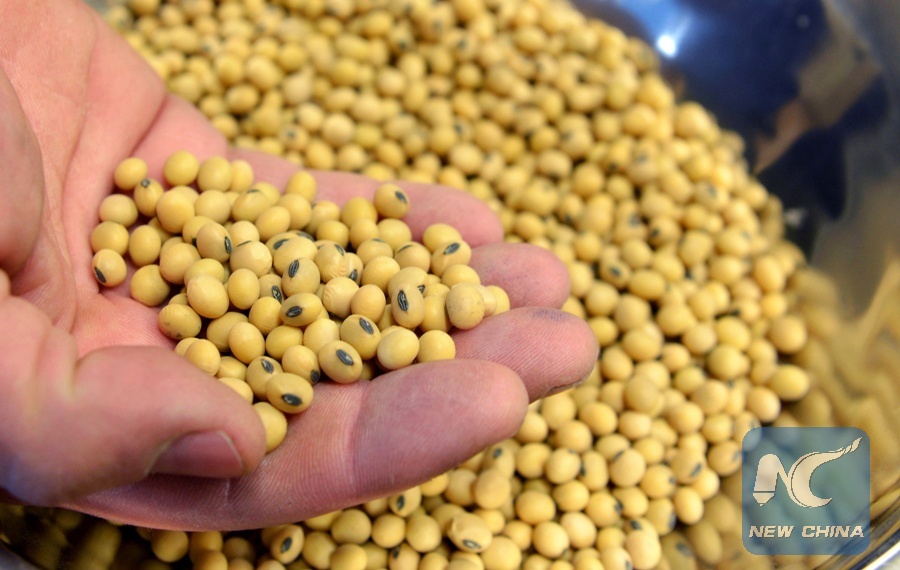
A sample of clean, processed soybeans at Peterson Farms Seed facility in Fargo, North Dakota, U.S., Dec. 6, 2017. (Xinhua/REUTERS)
by Robert Stanton
HOUSTON, April 17 (Xinhua) -- From the Texas Gulf Coast to the American heartland, ranchers, farmers and petrochemical producers are expressing uneasiness over the growing U.S.-China trade friction.
Last year, China imported more than 130 billion U.S. dollars in U.S. commodities, according to U.S. Import and Export Merchandise trade statistics. If more tariffs are implemented, it not only would impact their bottom line but put many out of business, U.S. producers have said.
"Illinois Farm Bureau and its members are very concerned about the escalating tariff dispute with China and its potential to devastate the farm economy," said Tamara Nelson, senior commodities director at the Illinois Farm Bureau. "The rhetoric and threats must stop. Recent market volatility has already adversely affected farmers, who are already suffering their fifth straight year of economic decline."
Last year, Illinois farmers exported 5.3 billion U.S. dollars in goods to China, including 1.3 billion U.S. dollars in soybeans and 2.3 billion U.S. dollars in pork, according to U.S. Import and Export Merchandise trade statistics.
Earlier this month, the U.S. administration on Tuesday announced a proposed list of products subject to additional tariffs, which covers Chinese exports worth 50 billion dollars with a suggested tariff rate of 25 percent.
China then hit back at U.S. unilateralism with equal tariff plan, unveiling a list of products worth 50 billion dollars imported from the United States that will be subject to higher tariffs, including soybeans, automobiles, and chemical products.
Bob White, director of national government relations at the Indiana Farm Bureau, is concerned that the market volatility would hurt farmers who are already struggling due to a surplus of grain in the market.
"The impacts of the proposed tariffs from China could be detrimental to U.S. and Indiana agriculture," he said. "Farmers in Indiana and across the country have worked hard to provide a reliable, quality product to our export partners. Replacing a market as large as China will not be an easy task and family farmers will likely suffer if the tariffs are imposed."
Indiana last year reported 2 billion U.S. dollars in total exports to China, including 26 million U.S. dollars in soybeans, the trade statistics show.
By necessity, Kansas farmers and ranchers are patient and optimistic, said Kansas Farm Bureau President Richard Felts. But U.S.-China trade dispute is testing that resilience.
"Growing trade disputes have placed farmers and ranchers in a precarious position," said Felts, a Kansas farmer. "We have bills to pay and debts we must settle and cannot afford to lose any market."
Meanwhile, Minnesota farmers are also worried that the trade friction with China will hurt more than help.
"China is a critical market for Minnesota agriculture, especially for soybeans, dairy, pork and wheat," said Minnesota Farm Bureau President Kevin Paap. "The recent actions by one of our largest trade partners could prove to be detrimental to Minnesota farmers and ranchers. The current trade disputes need to be resolved without harming agriculture."
In Missouri, farm prices are already dropping in response to the trade announcement, at a time when prices are already at break-even or below, according to the Missouri Farm Bureau (MFB).
"If fully implemented, these actions spell trouble for Missouri agriculture producers," said MFB President Blake Hurst. "China is by far the leading destination for U.S. soybeans, with the country buying nearly two thirds of all U.S. soybeans exported, and one fourth of our total crop."
He added, "It is hard to remember a more potentially calamitous week for U.S. agriculture."
In Houston, petrochemical industry officials are bracing for some tough economic times as the tit-for-tat tariff hikes continue unabated, said Steven W. Lewis, C.V. Starr Transnational China Fellow at the James A. Baker III Institute for Public Policy.
"There are reports that many petrochemical products, especially plastics, will be affected by new tax rates on imports to China," said Lewis, an Asian Studies professor at Rice University. "This is one of Houston's key industries and exports to China."
"China already has restrictions on many energy industry services that Houston provides," he said. "Texas agriculture will also suffer if the relationship deteriorates, although perhaps not as much as other states, given the specific agricultural goods targeted."

